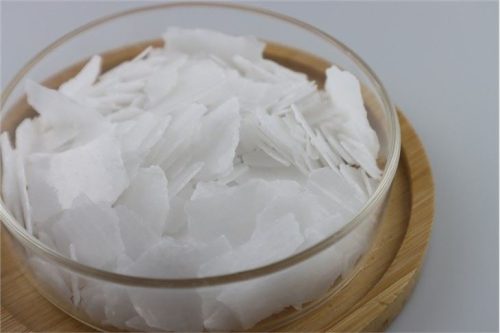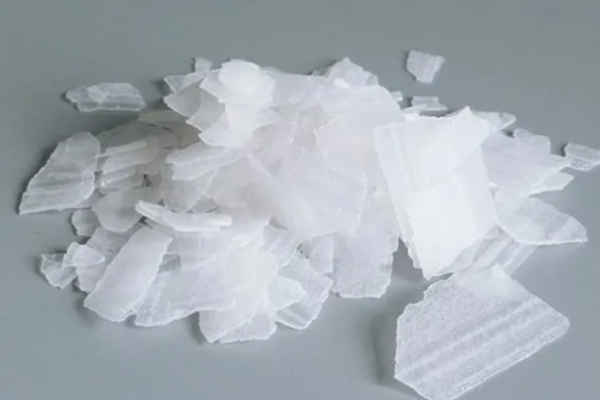Caustic soda, also known as sodium hydroxide (NaOH), is one of the most widely used chemicals in the industrial sector. This powerful alkali plays a crucial role in numerous manufacturing processes. Because of its ability to break down organic materials and react with a variety of substances, caustic soda significantly enhances industrial manufacturing. From paper production to water treatment, industries use caustic soda for cleaning, refining, and chemical processes. In this article, we will explore the diverse applications of caustic soda in industrial manufacturing and discuss how it boosts the efficiency and quality of manufacturing processes.
What is Caustic Soda?
Caustic soda (NaOH) is a highly reactive chemical compound that appears as a white, solid material in its pure form. Manufacturers produce it through the electrolysis of sodium chloride (NaCl), which results in the production of sodium hydroxide, chlorine, and hydrogen gas. Caustic soda is a strong base, making it useful for a broad range of industrial applications. These include neutralizing acids and producing detergents and other chemicals.
Furthermore, caustic soda is highly soluble in water, forming an alkaline solution that serves various chemical and cleaning processes. However, due to its caustic and corrosive nature, workers must handle it carefully, as it can cause severe damage to living tissues and materials.

How Caustic Soda Improves Industrial Manufacturing
Caustic soda is indispensable in many industrial processes due to its unique properties. Below are some of the primary ways it improves industrial manufacturing:
1. Paper and Pulp Industry
Caustic soda plays an essential role in the paper and pulp industry. It is vital in the pulping process, where it breaks down wood fibers and creates a slurry of pulp. Specifically, caustic soda combines with sodium sulfide in a process known as “kraft pulping,” which dissolves the lignin binding the wood fibers together. As a result, this process produces strong, durable fibers and removes impurities, leading to high-quality paper production.
2. Soap and Detergent Manufacturing
Caustic soda is also crucial in soap and detergent manufacturing. It reacts with oils or fats in a chemical process called saponification, which breaks down the oils and fats to create soap. Additionally, caustic soda is involved in producing other cleaning agents and detergents that are essential for both household and industrial cleaning applications.
3. Water Treatment
In water treatment, caustic soda plays a key role in neutralizing acidic water and adjusting its pH levels. When added to water, caustic soda raises the pH, reducing acidity. This treatment ensures that water meets quality standards for industrial use, drinking, or disposal. Moreover, it helps remove heavy metals from wastewater, which aids in reducing environmental pollution.
4. Chemical Manufacturing
The chemical industry relies heavily on caustic soda as a feedstock in producing chemicals like sodium carbonate, sodium bicarbonate, and sodium hypochlorite. Manufacturers also use it to produce synthetic fibers, plastics, and petroleum products. Caustic soda functions as a catalyst, neutralizer, or reagent in many chemical reactions, leading to the production of desired products.
5. Oil Refining
Caustic soda plays a vital role in oil refining, especially in refining edible oils and removing impurities from crude oil. It is used in a process called “degumming,” where it removes phospholipids and other impurities from vegetable oils, improving product quality. Furthermore, caustic soda neutralizes free fatty acids in oils, making them more stable and extending their shelf life.

6. Food Processing
In food processing, caustic soda is used in tasks like peeling fruits and vegetables. The chemical helps remove skins from potatoes, tomatoes, and other produce in a process known as lye peeling. Additionally, caustic soda processes cocoa beans and produces certain food additives, improving both the efficiency and cost-effectiveness of food production.
7. Aluminum Production
In aluminum production, caustic soda is crucial in the Bayer Process. During this process, manufacturers treat bauxite ore with caustic soda to dissolve aluminum oxide, leaving behind impurities like silica. The aluminum oxide is then extracted and refined to produce pure aluminum. Without caustic soda, large-scale aluminum production would not be possible.
8. Petrochemical Production
Caustic soda helps in petrochemical production by removing sulfur compounds from natural gas and petroleum products. This process, known as “sweetening,” is vital because sulfur compounds can harm both human health and the environment. By using caustic soda to remove these impurities, petrochemical manufacturers can produce cleaner, more environmentally friendly products.
9. Textile Industry
Caustic soda is employed in the textile industry in the process of mercerization. This process involves treating cotton fibers with caustic soda, which improves their strength, luster, and ability to absorb dyes. The result is a higher-quality fabric that is more durable and visually appealing.
10. Cleaning and Degreasing
Caustic soda is essential in industrial cleaning and degreasing applications. It effectively breaks down grease, oils, and other organic materials, making it crucial for cleaning equipment and machinery across various industries. Its ability to dissolve fatty acids and oils makes it ideal for maintaining factory equipment, pipelines, and other industrial assets.

Benefits of Caustic Soda in Industrial Manufacturing
Caustic soda offers several advantages in manufacturing processes, including:
- Cost-Effectiveness: Caustic soda is relatively inexpensive, making it a cost-effective solution for many industrial processes.
- Versatility: It has a wide range of applications in different industries, from chemical manufacturing to food processing.
- Efficiency: Caustic soda speeds up reactions, making manufacturing processes faster and more efficient.
- Enhanced Product Quality: By removing impurities and improving material properties, caustic soda enhances the quality of the final product.
- Environmental Benefits: Caustic soda plays a role in neutralizing acidic wastewater, reducing environmental harm.
Applications of Caustic Soda: A Summary
[table id=3 /]
FAQ: Caustic Soda Applications
1. What is caustic soda used for in industrial manufacturing?
Caustic soda is used in numerous manufacturing processes, such as paper production, soap manufacturing, water treatment, and chemical production. It plays a key role in cleaning, refining, and chemical synthesis.
2. Is caustic soda safe to use in food processing?
Yes, caustic soda is commonly used in food processing, especially for tasks like peeling fruits and vegetables. However, workers must handle it carefully to avoid contamination of food products.
3. How does caustic soda help in water treatment?
Caustic soda helps neutralize acidic water, adjust pH levels, and remove impurities like heavy metals from wastewater. These processes ensure that water meets safety standards for industrial use or consumption.
4. Is caustic soda used in oil refining?
Yes, caustic soda is used in oil refining to remove impurities from crude oil and edible oils. It also neutralizes free fatty acids, improving the quality and stability of the oils.
5. What industries rely on caustic soda for manufacturing?
Industries such as paper production, chemical manufacturing, food processing, water treatment, oil refining, and textiles all rely on caustic soda to improve efficiency and product quality.
Conclusion
Caustic soda is an essential chemical in industrial manufacturing. Its versatility, efficiency, and cost-effectiveness make it indispensable across various industries, including paper production, soap manufacturing, water treatment, chemical processing, and oil refining. By breaking down organic materials, neutralizing acids, and enhancing product quality, caustic soda helps improve manufacturing processes and contribute to the production of higher-quality goods. Whether used for cleaning, chemical reactions, or refining processes, caustic soda continues to play a vital role in advancing industrial manufacturing and boosting efficiency across multiple sectors.

